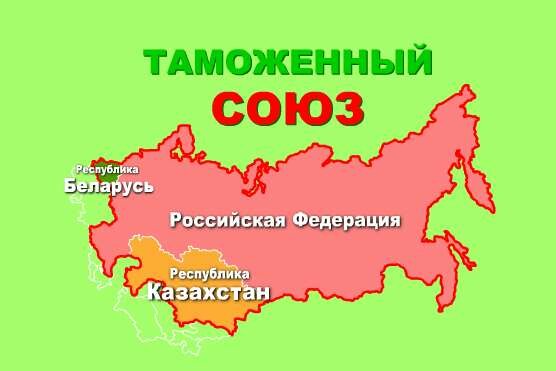
At the end of April this year Russia launched another campaign of ultimatum threatening Ukraine on the issue of European integration. Thus, according to statements of representatives of the Russian Federation’s leadership, in case of Ukraine’s signing agreements on association and free trade zone with the EU, member states of the Customs Union - Russia, Belarus and Kazakhstan - may close their borders to Ukrainian goods that will have disastrous consequences for Ukraine .
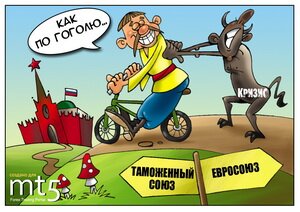 |
|
The Customs Union is on the threshold of a deep crisis http://www.mt5.com/ |
Usually on the side of Russia in this issue immediately appears a number of Ukrainian political forces that for various reasons stand for Ukraine's joining post-Soviet integration structures. However, neither Russian representatives nor their Ukrainian supporters say a single word about the aggravation of the problems that accompany recent activities of these structures. This applies primarily to the Customs Union which is on the verge of a deep crisis. For example, in 2012 the growth of bilateral trade rates within the CU dropped nearly three times - from 30% to 9%. The volume of trade of Kazakhstan with other members of the Customs Union in general was reduced by at least 30%.
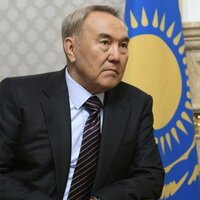 |
|
President of Kazakhstan N.Nazarbayev has criticized Russia’s attempts to use the Customs Union as a means for realization of the RF’s foreign policy goals at post-Soviet territories http://fmnenie.ru/ |
Amid these problems is getting intensified the conflict between Russia and the rest of the members of the CU concerning both, political and economic components of the organization. In particular, during the 11th Eurasian Media Forum in Astana on the 25th of April this year, Kazakhstan’s President N.Nazarbayev criticized Russia’s attempts to use the Customs Union as a means of implementing the RF’s foreign policy goals at post-Soviet territories. According to N.Nazarbayev, Kazakhstan considers the CU solely as a mechanism of economic integration of the three countries. In this context, he preserved for Kazakhstan the right to withdraw from any organization that infringes its sovereignty.
By the way, due to systematic problems with Russia in the energy sphere, Kazakhstan is trying to reduce the share of Russian energy carriers at its national markets as well as to load the capacities of its own oil refineries from other sources. Thus, according to the decision of the Government of Kazakhstan of 23d April, 2013, will be restricted imports of Russian oil products, including diesel fuel and petrol.
Even greater problems can be noticed in relations between Russia and its seemingly closest ally - Belarus. In particular, this concerns the prospects of their joint projects.
Thus, speaking with the annual message to the people and the country's Parliament on the 19th of April, 2013, President of Belarus Alexandr Lukashenko actually rejected plans for creation of a Russian-Belarusian Automobile Holding "ROSBELAVTO" at the base of the Belarusian Automobile Plant MAZ and Russian KAMAZ. According to him, the association of these enterprises is not profitable for Belarus as MAZ is already successfully operating at the market firmly holding its positions. At this, the President of Belarus expressed doubts about the intentions and capabilities of the Russian side to make a real contribution to the development of Belarusian enterprises.
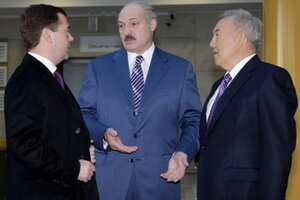 |
|
Russia and Belarus have already expressed mutual claims concerning the plans of creation of “Rosbelavto” http://nv-online.info/by/ |
At one time, Russia and Belarus did express serious mutual concerns about the plans of the creation of "ROSBELAVTO." Russia is not satisfied with Belarus’s demand to retain for MAZ some market and sale structures, the right to conduct research and development of new equipment at the newly created in Minsk science and technology center and at research plant, as well as the mandatory use in the final product of not less than 40% of Belarusian components.
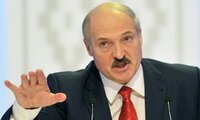 |
|
Belarus proposes to preserve independence of “Minsk Plant of Wheeled Tractors” http://www.quorum.kz/ |
Significant differences are also observed in the plans of implementation of other strategically important projects. First of all it concerns the inclusion of "Minsk Plant of Wheeled Tractors" into the structure of the Russian military-industrial complex.Thus, the Russian side insists on the horizontal integration of the Belarusian plant with enterprises of the Russian defense industry, in particular, with KamAZ and Uralvagonzavod. Belarus proposes to maintain its independence, only expanding cooperation with Russian enterprises, like the corporation "Moscow Institute of Thermo Equipment", Defense Concern "Almaz-Antey" and other users of Belarusian wheeled vehicles.
The situation is similar with Russia’s plans to get a controlling stake in the Belarusian JSC "Grodno Nitrogen". Belarus is strongly delaying the implementation of this project, each time imposing new requirements and changing agreements.
Besides, like Kazakhstan, Belarus does not agree with Russia’s attempts to give political content to the Customs Union of Russia, Belarus and Kazakhstan. This position was confirmed by A. Lukashenko during his meeting with the Prime Minister of Kazakhstan S.Ahmetov on the 25th of April this year.
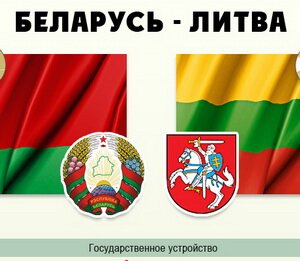 |
|
The economic cooperation of Belarus with Baltic countries is actively developing, in particular, with Lithuania http://freesmi.by/ |
Instead, despite the known political problems, actively is developing economic cooperation between Belarus and the Baltic states, in particular, with Lithuania. Thus, contrary to previous statements of the President of Belarus A. Lukashenko on plans of reorientation of Belarusian exports from Lithuanian to Russian ports, in April 2013 Belarusian state-owned company "Belaruskaliy" invested 30 million US dollars into acquisition of 30% shares of one of the terminals in the port of Klaypeda. There have been talks about buying shares of another Klaipeda transport company.
According to the Prime Minister of Belarus M.Myasnykovych, on the 9th Lithuanian-Belarusian Investment Forum in April this year, this will almost twice increase the volume of transit of Belarusian goods through the Lithuanian port of Klaipeda. Accordingly, will be expanded opportunities for participation of Lithuania and Belarus in measures of the United States and NATO concerning logistics of International Forces in Afghanistan and their withdrawal in the future from the Afghan territory (by the end of 2014) via the so-called "northern transport route." This creates the basis for enhanced cooperation between Belarus and the USA and NATO in the economic and military spheres.
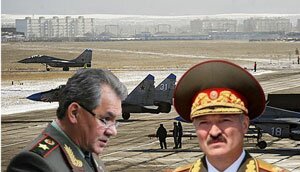 |
| A.Lukashenko rejected the statement of the Defence Minister Shoyhu concerning the plans of the sides to create in the nearest future a Russian aviation base at the Belarusian territory |
Against this background, pretty typical look contradictions between Belarus and Russia in security issues that earlier used to form the basis of the integration processes between the two countries within the framework of the Union State of Belarus and Russia and the Organization of the Collective Security Treaty. Thus, on the 30th of April A. Lukashenko denied the statement of the Minister of Defence S.Shoyhu about the plans of the sides to create soon a Russian air base at the Belarusian territory. According to the President of Belarus, he will never take any steps that would threaten the sovereignty of his country. At this, Alexandr Lukashenko expressed only interest in acquiring Russian planes Su-27 and MiG-29.
An essential problem of the Customs Union is also the state of the economy of the Russian Federation, which is becoming more complex. Thus, in 2012, GDP growth in Russia decreased from 4.3% to 3.4%. Within these indexes the industry growth rate fell from 4.7% to 2.6%, and the volume of agricultural production in general declined by about 5%. At the same time have also decreased exports of oil - by 2.3% and gas - by 6.1% (respectively, the income of the Russian "Gazprom" has fallen by 10%). As a result, the national debt has increased by 22.1% (to 10.5% of GDP) and the deficit of the state budget is fixed at 0.06% of GDP (in 2012 the surplus was 0.8% of GDP).
 |
|
Russian experts are forecasting transfer of the Russian economy to the stagnation variant of the development within the nearest months |
Negative trends in the economy are also observed in the first half of 2013. Consequently, Russian experts predict the transition of the Russian economy to stagnation variant within the nearest months.
The above circumstances lead to further decline in the authority of the leadership of the Russian Federation among the population, including Russian President Vladimir Putin himself. In particular, according to sociological surveys, in April 2013 the activity of Putin as President of Russia was supported by 51% of the Russian population, while in April 2012 the figure was 73%.
All this plainly explains the real reasons for Russia’s active attempts to draw Ukraine into the Customs Union of Russia, Belarus and Kazakhstan. First of all, it refers to the process of re-launching the integration processes within the framework of the CU in order to prevent its ultimate collapse. Ukraine’s rapprochement with the Customs Union has to show that the CU, in spite of existing problems, retains its positive potential.
Besides, a separate aspiration of the Russian Federation and the Russian oligarchic circles is to solve economic problems in Russia and expand their own business, having established control over Ukraine and its economic potential – one of the most attractive ones among the countries of the former USSR. In this context, Russia is most of all interested in the gas transportation system of Ukraine as a strategic means of increasing Russian presence at the European gas market. This issue is becoming particularly important for Russia because of lower demand for Russian gas in Europe and, accordingly, the loss of profitability of gas transmission systems that are built by Russia to bypass Ukraine.
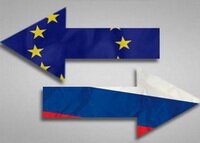 |
|
Ukraine’s joining the Customs Union has to counterbalance the process of its European integration http://vu.ua/ |
And of course, inclusion of Ukraine in the Customs Union should counterbalance the process of its European integration that is going into the practical plane of implementation of plans of signing the agreements about association and free trade zone between Ukraine and the EU.
What can happen to Ukraine in case of its joining the CU - demonstrates the experience of Belarus, which remains subject to increased pressure from the Russian Federation, despite the alliance between the two countries. Thus, in late April the leadership of the RF refused to agree with Belarus their plans to increase deliveries of Russian oil to Belarusian refineries. The reason for this is openly called inhibition by the Belarusian side of implementation of joint with Russia economic projects.
|
|
|
|

